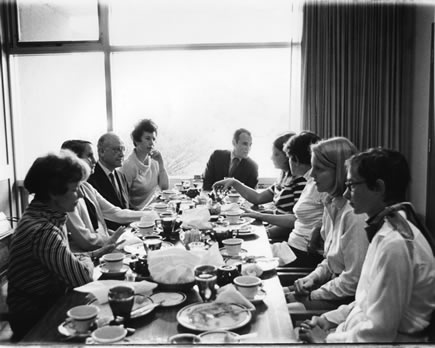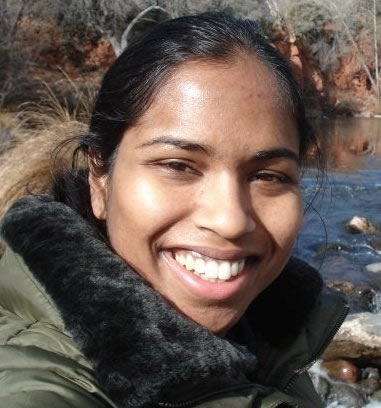Forty Years Later: Wellesley's Decision
to Stay
a Women's College Revisited
FOR IMMEDIATE RELEASE:
February 27, 2009 |
|
 |
Members of the 1971 Commission on the Future of the College meet. Mary Lefkowitz '57 (far right), professor emerita in the humanities, and Alan Schechter (head of the table), professor emeritus of political science, are among the commission members who will revisit the group's recommendation to admit men to
Wellesley College during an event March 11. |
WELLESLEY,
Mass. -- Vassar College went co-ed; so did Yale. In the midst of financial issues and student and faculty unrest, Wellesley College had many important decisions to make in 1969 —including whether to admit men.
“If we refuse to do any thinking about coeducation, we would be the greatest female ostrich in the educational zoo,” said then Wellesley College President Ruth Adams to Alumnae Council that year.
Forty years ago, the Commission on the Future of the College, formed of students, faculty, trustees and alumnae, worked for two years and more than 2,000 hours to make recommendations on the college’s future. One result: a 9-4 vote in favor of
admitting men to Wellesley, a recommendation Wellesley’s board of trustees rejected.
Several of the commission’s members will revisit their decision during “Co-Ed Wellesley: Perspectives on the 1971 Commission on the Future of the College” Wednesday, March 11, at 7 pm in the Library Lecture Room on the Wellesley College campus.
Mary Lefkowitz ’57, professor emerita in the humanities; Alan Schechter, professor emeritus of political science; and alumna Louisa Kasdon ’72, former senior class president, will speak about their experiences on the commission. Susan Reverby, professor of women’s studies, will put the commission’s findings in a modern context and speak about her experiences in the women’s studies department, which was founded in the early 1980s, post-commission.
 |
“Many people were upset that the trustees turned down the majority decision, but they didn’t do anything about it,” said Wellesley College senior Susae Elanchenny. “Today, would students just go on Community [e-mail] and talk about it, or would they do something?” |
Today’s students often don’t realize that what they consider to be part of Wellesley’s core mission was once up for debate, says Wellesley College senior Susae Elanchenny.
“When I came to Wellesley, I knew it had always been a women’s college and it was so clear to me what that meant — it was about women who will make a difference in the world. Being a women’s college is so essential to Wellesley’s identity,” said Elanchenny, who serves as president of Clio: History Club, the sponsoring organization.
At the time, many students— including panelist Kasdon and the editors of The Wellesley News — supported the commission’s decision to admit men.
“When the commission started, the feminist view was that women’s colleges were outdated, that women could and should compete with men and not be ‘cloistered,’” Elanchenny said. “By 1971, that idea was already changing.”
Lefkowitz is happy things turned out as they did.
“It was a decision that turned out being more intelligent than I had any reason to believe at that time,” said Lefkowitz, who publicly dissented from admitting men. “I think the women’s movement really got going at that point and, in fact, made our conservative decision look chic and radical.”
The college’s financial worries and tough decisions at the time parallel many of the challenges and changes we face today, Elanchenny says. The current economy, and the effects that it will have at Wellesley, sparked interest for the history club to examine a past time of trouble at the college, and how the community dealt with it.
“Many people were upset that the trustees turned down the majority decision, but they didn’t do anything about it,” she said. “Today, would students just go on Community and talk about it, or would they do something?”
Wellesley’s history shows that the system we have in place now is not inevitable, and Elanchenny hopes that attendees will think about how they might handle (and be affected by) radical change.
“I don’t think I would have grown as much as I have or be as sure of myself as I am if it hadn’t been for Wellesley,” she said. “(Planning this event) has made me think about what Wellesley means to me.”
Fortunately for Elanchenny and others who cherish the women’s college experience, Wellesley has no plans to revisit the co-ed question.
Wellesley College has been a leader in the education of women for more than 130 years.The College's 500-acre campus near Boston is home to 2,300 undergraduatestudents from all 50 states and 65 countries.
###
|

